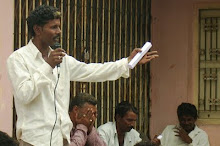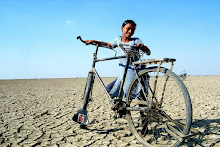Financial Express: Satish Jha: Wednesday, 16 May 2012.
Kharaghoda (Surendranagar)Eleven-year-old Ramjibhai Bhimani, son of an agariya (salt pan worker), timidly opens his school bag and takes out things one by one a bunch of unused pencils, erasers, sharpeners and a bundle of books. “I got them from school at the Rann,” he says. But a moment later he disappears when he is asked to tell the name of his country, its prime minister, name of his state and its chief minister.
For him, the world ends in the white expanse of salt in the Little Rann of Kutch where his parents are salt pan workers, and the rest of the year at their home in Kharaghoda. They have never heard about their “right to education”.
“He (Ramji) is studying in Class V for past three years as he failed in the examinations. His elder brother Tulsi, 14, is still in class IV. The school gives books and pencils to the children but those are of no use. Most of the children who study in these schools are like my sons. The teachers are irregular and they don’t teach the children at all,” said Bijalbhai Bhimani, 51, an agariya and father of Ramji.
Bhimani, who owns seven salt pans, blames the school management. He said the school gave his son everything from books to breakfasts, but no education.
To educate the thousands of children in the Little Rann of Kutch from Surendranagar district, 13 schools are being run for salt pan workers’ children who come to stay in the Rann for eight months from October to May with their families. In the Rann, more than 2,700 families from Patdi, Dhrangadhra and Halvad talukas are said to be involved in salt farming.
For imparting primary education to the children, several NGOs and government organisations have been working for more than 15 years now. Model schools were set up and teachers were brought in the Little Rann spread in more than 5,000 sq km. But when it comes to the quality of education the situation has worsen over the years. Locals blame NGOs and government agencies for their poor show.
“There are 13 schools at present in which 354 children have enrolled this year. In each school, there is a lone while the number of students could vary from 20 to 60. The education being given to the children is nothing but a joke as the teachers themselves need to be trained first. They are pass-outs of Class X or XII, from the community itself who are not good enough for the job,” said a government official on the condition of anonymity.
He said “no graduate is willing to take the task of educating the children in the Rann where living condition is tough”.
NGOs have also worsened things. Various irregularities were found during government officers visited in the schools. Sources said in 2009, IG Patel, Mamlatdar, Patadi, reportedly found several schools running only on paper. After that visit the government took over the charge to run the schools. At present the schools are run under Sarva Sikhsha Abhiyan (SSA).
Sukhdev Patel of Gantar, who has been working in the area since 1996 and is hailed as the first one to have started education initiatives for the children in the Little Rann, refuted the allegations saying “education is the responsibility of state government and not an NGO’s work.
















.jpg)
.jpg)
.jpg)
.jpg)













No comments:
Post a Comment